
Tux Droid is a wireless robotic penguin figure based on the Linux mascot, Tux, released around 2007. [1] It was manufactured by a company named KYSOH.

Tux Droid is a wireless robotic penguin figure based on the Linux mascot, Tux, released around 2007. [1] It was manufactured by a company named KYSOH.
The Tux Droid measures 210mm × 180mm × 140mm with lowered wings. It supports Linux kernel 2.4 or later and needs an 800 MHz CPU and 128 MB RAM. Communication from Tux Droid to the computer is via signaling operating in the 802.11 WLAN band, but not compatible with Wi-Fi. The Tux Droid receives signals from a plastic fish-shaped USB receiver. An infrared remote control is supplied; signals from this are received by Tux Droid and sent to the host software over the wireless link. It needs an internet connection for media detection. The mascot is driven by Atmel AVR RISC microcontrollers. The Tux Droid only supports Linux computers. [1] [2] [3]
The Tux Droid can spin around, flap its wings, and light up its eyes. It came with bundled open source software to customize its functionality. [3] It can announce events by its gestures such as dancing, flapping, and spinning, [4] and by ALSA driven sound. The events are detected by specific gadgets, which are handled by the Tux Gadget Manager. [1] [2]
The Tux Droid received positive reviews for its functionality, the open source software, and its humor and novelty value. [1] [4] [3] Some reviewers did note the high asking price at the time, at £89.95, and that the software only worked on Linux. [5]

Mandriva Linux is a discontinued Linux distribution developed by Mandriva S.A.

Tux Racer is a 2000 open-source winter sports racing video game starring the Linux mascot, Tux the penguin. It was originally developed by Jasmin Patry as a computer graphics project at the University of Waterloo. Later on, Patry and the newly founded Sunspire Studios, composed of several former students of the university, expanded it. In the game, the player controls Tux as he slides down a course of snow and ice collecting herrings.

Frozen Bubble is a free software clone of Puzzle Bobble for a variety of home and mobile systems.

linux.conf.au is Australasia's regional Linux and Open Source conference. It is a roaming conference, held in a different Australian or New Zealand city every year, coordinated by Linux Australia and organised by local volunteers.
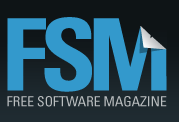
Free Software Magazine is a Web site that produces a mostly free-content online magazine about free software.
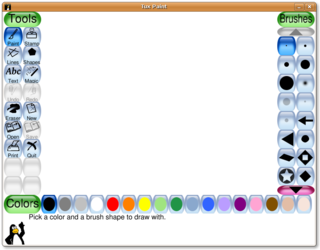
Tux Paint is a free and open source raster graphics editor geared towards young children. The project was started in 2002 by Bill Kendrick who continues to maintain and improve it, with help from numerous volunteers. Tux Paint is seen by many as a free software alternative to Kid Pix, a similar proprietary educational software product.

Larry Ewing is an American computer programmer who is known as the creator of the Linux mascot, Tux. The artwork was created in 1996, while Ewing was a student at Texas A&M University, originally as a submission to a contest to create the Linux logo. Though Ewing's submission didn't win, his artwork was adopted as the Linux "brand character". Ewing also created the Ximian and Mono monkey logos and is involved in:
Linux Game Publishing was a software company based in Nottingham in England. It ported, published and sold video games running on Linux operating systems. As well as porting games, LGP also sponsored the development of Grapple, a free software network library for games. As well as acting as a Linux game porter in of themselves, they also functioned as a publisher for other Linux game developers and porters. The company was dissolved on 3 May 2011.
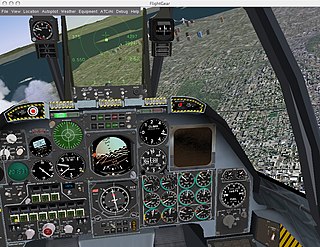
An open-source video game, or simply an open-source game, is a video game whose source code is open-source. They are often freely distributable and sometimes cross-platform compatible.
HAL is a software subsystem for UNIX-like operating systems providing hardware abstraction.
The Classmate PC, formerly known as Eduwise, is Intel's entry into the market for low-cost personal computers for children in the developing world. It is in some respects similar to the One Laptop Per Child (OLPC) trade association's Children's Machine (XO), which has a similar target market. Although made for profit, the Classmate PC is considered an Information and Communication Technologies for Development project (ICT4D). Introduced in 2006, the device falls into the then popular category of netbooks.
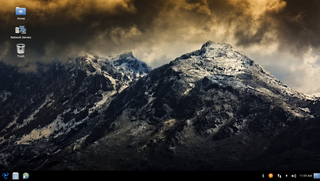
Trisquel is a computer operating system, a Linux distribution, derived from another distribution, Ubuntu. The project aims for a fully free software system without proprietary software or firmware and uses a version of Ubuntu's modified kernel, with the non-free code removed. Trisquel relies on user donations. Its logo is a triskelion, a Celtic symbol. Trisquel is listed by the Free Software Foundation as a distribution that contains only free software.

Tux, of Math Command is an open source arcade-style video game for learning arithmetic, initially created for Linux.

cowsay is a program that generates ASCII art pictures of a cow with a message. It can also generate pictures using pre-made images of other animals, such as Tux the Penguin, the Linux mascot. It is written in Perl. There is also a related program called cowthink, with cows with thought bubbles rather than speech bubbles. .cow files for cowsay exist which are able to produce different variants of "cows", with different kinds of "eyes", and so forth. It is sometimes used on IRC, desktop screenshots, and in software documentation. It is more or less a joke within hacker culture, but has been around long enough that its use is rather widespread. In 2007, it was highlighted as a Debian package of the day.

Tux is a penguin character and the official brand character of the Linux kernel. Originally created as an entry to a Linux logo competition, Tux is the most commonly used icon for Linux, although different Linux distributions depict Tux in various styles. The character is used in many other Linux programs and as a general symbol of Linux.
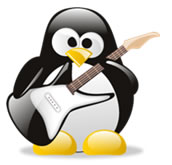
TuxGuitar is a free and open-source tablature editor, which includes features such as tablature editing, score editing, and import and export of Guitar Pro gp3, gp4, and gp5 files. In addition, TuxGuitar's tablature and staff interfaces function as basic MIDI editors.
A photovoltaic keyboard, or solar keyboard, is a wireless computer keyboard that charges its batteries from a light source such as the sun or interior lighting, addressing a major drawback of wireless computer peripherals that otherwise require regular replacement of discharged batteries.

The Motorola Droid 4 (XT894) is a smartphone made by Motorola Mobility. It was released with Android 2.3 and can be upgraded to Android 4.1. It was released on Verizon Wireless's network on February 10, 2012. It is the successor to Motorola's Droid 3, and is one of the first smartphones to support GLONASS in addition to GPS.

The PinePhone is a smartphone developed by Hong Kong-based computer manufacturer Pine64, intended to allow the user to have full control over the device. Measures to ensure this are: running mainline Linux-based mobile operating systems, assembling the phone with screws, and simplifying the disassembly for repairs and upgrades. LTE, GPS, Wi-Fi, Bluetooth and both cameras can be physically switched off. The PinePhone ships with the Manjaro Linux operating system using the Plasma Mobile graphic interface, although other distributions can be installed by users.
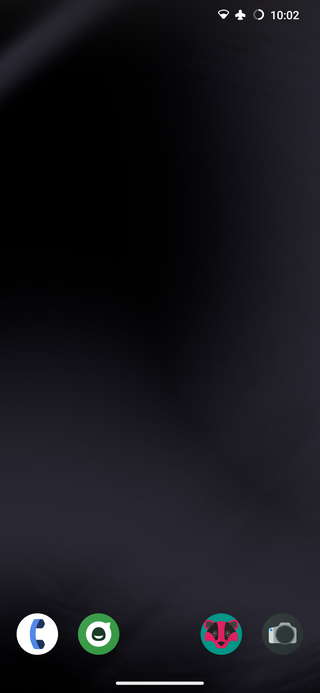
DivestOS is an operating system based on the Android mobile platform. It is a soft fork of LineageOS that aims to increase security and privacy with support for end-of-life devices. As much as possible, it removes unnecessary proprietary Android components and includes only free-software.